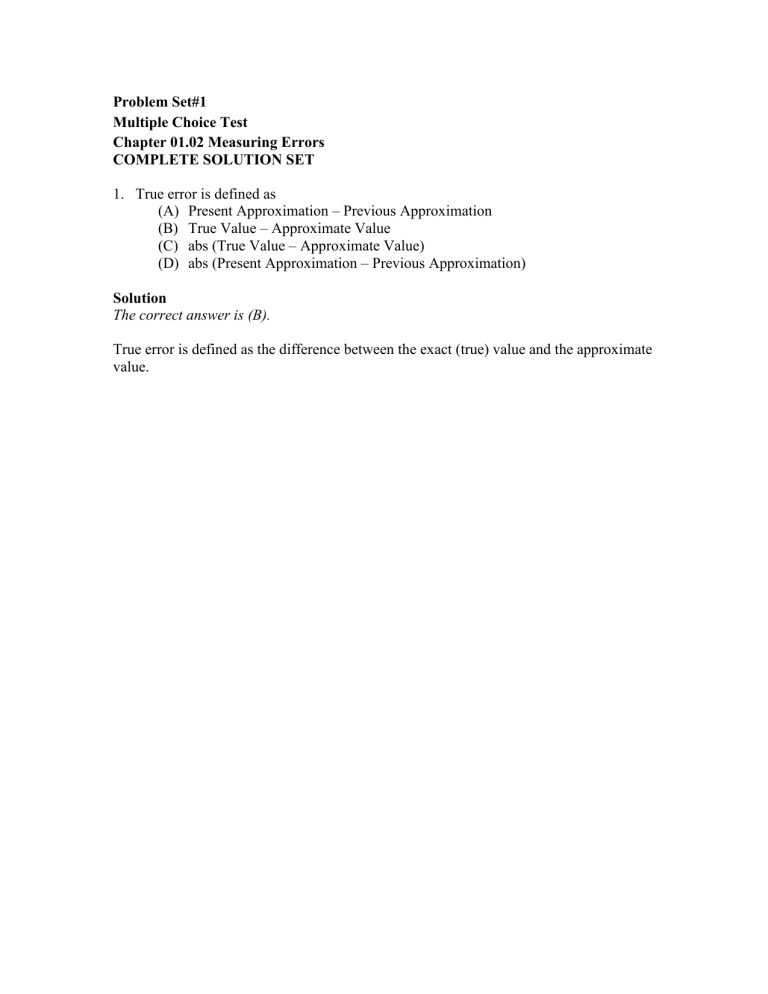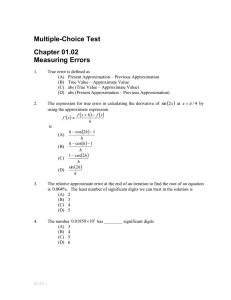
Problem Set#1 Multiple Choice Test Chapter 01.02 Measuring Errors COMPLETE SOLUTION SET 1. True error is defined as (A) Present Approximation – Previous Approximation (B) True Value – Approximate Value (C) abs (True Value – Approximate Value) (D) abs (Present Approximation – Previous Approximation) Solution The correct answer is (B). True error is defined as the difference between the exact (true) value and the approximate value. 2. The expression for true error in calculating the derivative of sin (2 x ) at x = using the approximate expression f ′( x ) ≈ h − cos(2h ) − 1 h h − cos(h ) − 1 (B) h 1 − cos(2h ) (C) h sin (2h ) (D) h f (x + h ) − f (x ) is h (A) Solution The correct answer is (C). Exact answer f ( x) = sin( 2 x) f ′( x ) = 2 cos(2 x ) π π f ′ = 2 cos 2 4 4 =0 Approximate Solution f (x + h ) − f (x ) f ′( x ) ≈ h f ( x) = sin( 2 x) sin( 2( x + h)) − sin( 2 x) f ′( x) ≅ h sin(2 x ) cos(2h ) + cos(2 x ) sin(2h ) − sin(2 x ) = h π π π sin 2 cos(2h ) + cos 2 sin(2h ) − sin 2 π 4 4 4 f ′ ≅ h 4 π π π sin cos(2h ) + cos sin(2h ) − sin 2 2 2 = h (1) cos(2h ) + (0) sin(2h ) − 1 = h cos(2h ) − 1 = h Et = True Value – Approximate Value π 4 by cos(2h ) − 1 h 1 − cos(2h) = h =0− 4. The relative approximate error at the end of an iteration to find the root of an equation is 0.004% . The least number of significant digits we can trust in the solution is (A) 2 (B) 3 (C) 4 (D) 5 Solution The correct answer is (C). If ∈a ≤ 0.5 × 10 2− m , then at least m significant digits are correct in the answer. Given ∈a =| 0.004 |= 0.004% 0.004 ≤ 0.5 × 10 2− m m is at least 1, as 0.004 ≤ 0.5 × 10 2−1 , that is, 0.004 ≤ 5, is true, m is at least 2, as 0.004 ≤ 0.5 × 10 2 − 2 , that is, 0.004 ≤ 0.5, is true, m is at least 3, as 0.004 ≤ 0.5 × 10 2 −3 , that is, 0.004 ≤ 0.05, is true, m is at least 4, as 0.004 ≤ 0.5 × 10 2 − 4 , that is, 0.004 ≤ 0.005, is true, m is at not at least 5, as 0.004 ≤ 0.5 × 10 2−5 , that is, 0.004 ≤ 0.0005, is not true, So the least number of significant digits correct in my answer is 4. Alternative solution ∈a ≤ 0.5 × 10 2− m | 0.004 |≤ 0.5 × 10 2− m 0.004 ≤ 10 2− m 0.5 0.008 ≤ 10 2− m Taking log of both sides log10 (0.008) ≤ log10 (10 2− m ) − 2.0969 ≤ 2 − m m ≤ 2 + 2.0969 m ≤ 4.0969 Since m can only be an integer, m ≤ 4 . So the least number of significant digits correct in my answer is 4. 5. The number (A) (B) (C) (D) 0.01850 ×103 has ________ significant digits 3 4 5 6 Solution The correct answer is (B). The number 0.01850 ×103 has 4 significant digits (1, 8, 5, 0). The trailing zero in the number is significant, while all the leading zeros are not significant. 6. The following gas stations were cited for irregular dispensation by the Department of Agriculture. Which one cheated you the most? Station Actual Gasoline Gasoline Reading at dispensed pump Ser 9.90 10.00 Cit 19.90 20.00 Hus 29.80 30.00 She 29.95 30.00 (A) (B) (C) (D) Ser Cit Hus She Solution The correct answer is (A). The conclusion for this question will be based on relative true errors. 9.90 − 10.00 (Ser) ∈t = × 100 = −1.0101% 9.90 19.90 − 20.00 (Cit) ∈t = × 100 = −0.50251% 19.90 29.80 − 30.00 (Hus) ∈t = × 100 = −0.67114% 29.80 29.95 − 30.00 (She) ∈t = × 100 = −0.16694% 29.95 The gas station that cheated you the most is Ser as it has the largest magnitude of a negative relative true error of 1.0101%. 6. The number of significant digits in the number 219900 is (E) 4 (F) 5 (G) 6 (H) 4 or 5 or 6 Solution The correct answer is (D). In this case, the number of significant digits can be 4, 5 or 6. The trailing zeros may or may not be significant. For example, if someone asked you - What is the population of Tampa?. You most probably will reply as 325,000 as the other person is interested in a ball park figure. However, if someone was refunding taxes to every citizen of Tampa, you will need the exact number and that very well could be exactly 325,000 or 325,200 or 325,221 or 325,214.



